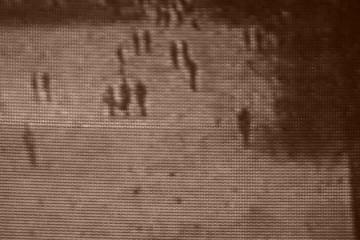IRISH WOOL
The poem cannot only be what it once was in writing. Also there is something spoken. Told maybe not. It is not so much about that.
One does not see as much as look into, and most viewing takes place through other texts. You are still reading Richard II. Then what writing gravitates towards your writing, especially when it is one or two words, and there is no need for them to follow each other: Stimmer, Himmel. Should that be enough for today? If it is nothing, it is more than enough. The pressure around the text deforms the impulse to generate it. Those pressures, once again, are found in the formulation: the narration of historical structures. Writing exists to the extent that it has not been studied. It is not to study that one reads, it is to see. The structure permits perception to develop, static, or agitated, veering. The movement between one word to the next as among groupings, clusters of intensities including color and the weight (gravity) of semantics, which the poem exists in order to disturb. Even the sentence does not need to obey the one that precedes it. Reading can also assume the form or posture, is it a pose, of obedience. Does one read Richard II or heed the commands of that English? You are reading Richard II in Russian. Everything is changed or can change, charged at the boundary of the parallel sign. Or else we complete an outline, filling in the shape we recognize, and language is neutralized. Becomes a quotation. Lifted from the space where there are edges, sharpenings, conflicts—what does not belong and what is more than what is needed—into the air thickened by the fumes of the formula. "Now is the Winter of our Discontent" distends like a dead branch from the birch tree the two men were sawing, illegally. Beyond them, behind the high fence (did you notice the barbed wire?) the great house rises in the splendor of new wood, windows and doors. They must work for the owner, the landowner, and sell to him the forest. The summer institute for orphans survives conspicuously alongside, silent in September. The woodsmoke is sweet among the small houses beside the stream where the loose cows stopped you from meandering.
The unpredictability of the most mundane detail, like a periscope surfacing from the mud at the bus stop. There is an old argument between invention and imagination. Yet the theory of submergence permits the most ridiculous assertion. Besides, one of the sailors who died on the Kursk came from this region, and the news was that the family was satisfied with the government's remuneration for their son, and proud of the attention his death occasioned. Why should anyone be remembered? Another monument appears above an inscription, and the shoppers acknowledge the inconvenience caused by the occupation of a certain amount of space. You are right, there is more humor in advertisements, despite the amusement of stray dogs urinating on Kirov. Can it be called life, lightness, glee, the volubility in an absurdity, like Our Boots Your Success? Even in the Russian there was no word play. A woman in lingerie reclines astride a tiger on a plastic bag, inside which are garlands of nettles bunched and drying. Nettle soup I can recognize from the writings of Eastern Europeans about everyday life in the labor camps. A Polish writer's account of the surplus brutality of Lithuanian and Ukrainian guards, eager to prove to their employers they were not Russian. It is the shape that I recognize, from memory, and the form is completed before I can admire the incongruity of the silk underwear worn by the woman on the tiger. Her husband must work for Gazprom, or the Duma. Wars are integral components of capitalist economies, as the cult of femininity is unthinkable without the military. You wear your sweater like a shirt, alert to the irony of every comfort. Except coffee.